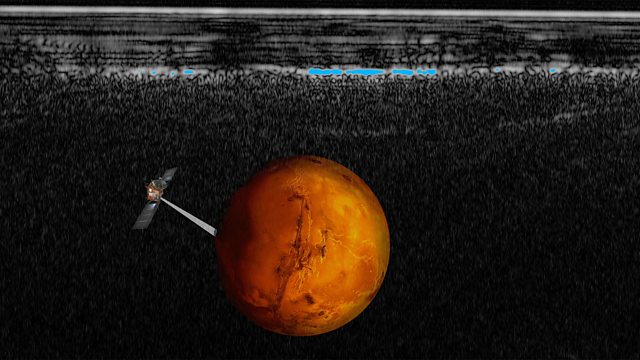
Mars Has Watery Lake
Water on Mars; IVF; Embryo Development; Oceans; Fertility; Fluorine and Dementia; AI and Breast Cancer Detection.
Scientists say they have discovered evidence of a 12 mile long body of water on Mars. Estimated to be at least a metre deep, the “lake” was found beneath the red planet’s southern polar ice cap by the agency’s radar probe, known as Marsis. Roland Pease speaks to mission scientist Roberto Orosei.
IVF Anniversary
The world’s first test-tube baby Louise Brown is celebrating her 40th birthday this week. Since the ground-breaking development of in vitro fertilisation which led to her birth, more than eight million babies have been born using this method. Claudia Hammond speaks to Ian Cooke, Emeritus professor at the University of Sheffield, who was the UK’s very first specialist in reproductive medicine.
Early Embryo Development
We've been growing embryonic cells in petri dishes for a few years now, to try to fill in the gaps in our understanding of early development, but the tissue that grows never really resembles an actual embryo. Magdalena Zernicka-Goetz is a developmental biologist from Cambridge University, and in a paper out this week she has leapt over this hurdle in developmental biology using three types of stem cell, which - unlike previous efforts - push a ball of cells to becoming an embryo, which could help us understand why pregnancy can fail. She speaks to Adam Rutherford.
The Last of the Wild Oceans
A study led by scientists from the University of Queensland has discovered that only 13% of the ocean worldwide has not been severely impacted by humans. The majority of these wilderness areas are not currently protected by law, and the researchers are highlighting an urgent need for action to protect what little remains. Lead author Kendall Jones speaks to Roland Pease.
Fertility
IVF can be gruelling physically and emotionally and often doesn’t work. One of the advantages of methods using less stimulation and monitoring is a reduction in stress for those undergoing treatment. Julia Leigh, who lives in Sydney, Australia, is an acclaimed Australian novelist and the author of a memoir called Avalanche. It’s a love story which recounts her personal experiences of having IVF, which sadly for her was ultimately unsuccessful.
Using Fluorine to Detect Dementia
University College London chemists are finding new ways to track degenerative diseases in the brain. They’ve used a radioactive form of fluorine which binds to areas of the brain that are diseased to illuminate those areas during scans, allowing them to track exactly how the disease develops, as Andrea Sella reports.
AI to Help with Breast Cancer Detection
A company based in Wellington, New Zealand is using AI and software to standardise mammograms, so that these x-rays, which are mostly digital, can be used to accurately measure changes in a woman’s breast tissue, and then assess a woman’s risk from breast cancer. Simon Morton reports.
Picture: Artists' impression - Mars Express probing the planet's surface. Marsis radar results above. Credit: ESA, INAF. Graphic rendering by Davide Coero Borga - Media INAF
The Science Hour was presented by Roland Pease with comments from Bobbie Lakhera.
Producer: Katy Takatsuki
Last on
More episodes
Previous
Broadcast
- Sat 28 Jul 2018 11:06GMT����ý World Service Americas and the Caribbean
Podcast
-
![]()
Unexpected Elements
The news you know, the science you don't

